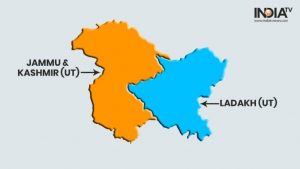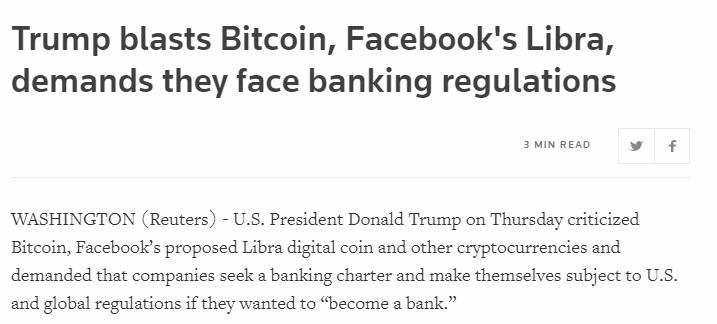Recently, I was posed a question from an aggrieved Bitcoin professional why I was such a strong critic of Bitcoins. Several questions were posed to me in this regard. My strong views on Bitcoins has estranged me with many of my friends in the technology domain. Some may think I am anti-development. In order to put my views in the right perspective, I want to clarify to the public why I sincerely feel that Bitcoin cannot be legitimized in India.
For records, I may also state that am fully supportive of the leaked version of the Bill which is allegedly being drafted by the Government which provides for stringent punishment for Bitcoin usage while retaining the option for the Government to use Block chain technology for its own Crypto Currency if required. This is fully in line with my views expressed in the past through various articles on this blog.
My views on the questions raised by my critics recently are reproduced here. I am willing to debate this further if any of the readers want to debate. (Following is a reply sent by me to a query of a journal dedicated to Bitcoin promotion)
Before you read further, I suppose you have read my very first post on Bitcoin. Published on December 22, 2013, it was titled “Why RBI Cannot/need not/should not ban Bitcoins?”. This was immediately after the Bitcoin conference in Bangalore where I spoke on the legal status of Bitcons in India. An article was also carried in Times of India titled “RBI has no legal right to ban use of bitcoin” . This article still figures on my blog with a note about why my view has changed since.
No doubt I was also initially attracted by the innovative idea of the “Bitcoin Mining” and how the blockchain system worked. At that time, I had looked at the issue purely from the legality under Indian law and opined that “Bitcoin” is an “Electronic Document” and since it has not been excluded under Section 1(4) of Information Technology Act 2000 (ITA 2000), it carried a “Recognition” as a “Commodity”.
Even at that time, I have been clear in my perception that “Mining” of bitcoin is different from “Trading”. I said “Mining” is legal and buying from a known miner is also not bad. But when a commodity is bought, the title to the property changes over to the buyer but along with the defects in the title to the commodity. The exception to this rule are the “Negotiable Instruments” and Bitcoin is not a “Negotiable Instrument”. Since a major portion of Bitcoin that is under circulation in a trading house comes from an earlier transaction which may involve drug trade or other illegal activities, the commodity is “Tainted” with the past defective title. This taint gets transferred whenever the bitcoin is sold to another, broken down to smaller denominations etc. Hence if the buyer does not know that the previous owner bought it from another clean previous owner etc and the chain of transaction is known to be clean till the miner of that particular Bitcoin, it is risky to buy Bitcoin.
Secondly, I was also clear that Bitcoin should not be called a “Currency” since any buying, selling or otherwise dealing with a commodity as a “Currency” is interfering with the right of the RBI to be the sole issuer of “Currency”.
For this reason, I stated that Bitcoin cannot be banned by RBI since it is an issue that has to be dealt with by an amendment of ITA 2000. However, in the domain of “Currency”, RBI is the sole issuer of currency and no body else can term their commodity as “Currency”.
I have also given example where a “Club” may use plastic chips as currency within its four walls but if it tries to promote it as currency in the transactions outside its premises, there could be interference with the RBI’s powers.
This view of mine has not changed and has got strengthened over a period of time since Bitcoin managers have steadfastly stuck to their right to let the system be considered as a “Currency” and without any intrusion of the central bank like RBI.
It is true that the popularity of Bitcoin with the public did not wane despite my opposition and the perception that “Bitcoin” is “Currency” got boost because of the various developments including some online merchants accepting it for payment of purchases in lieu of legit currencies etc.
With this background, let me try to address the specific questions raised.
-
- Why do you think Bitcoin should be banned in India?
Comments: The way Bitcoin has been promoted as an alternative to “Currency” and without the supervision of RBI and Tax authorities because of the anonymity of its ownership, has rendered Bitcoin as the most ideal form for storing “Black Money”. Since Bitcoin can be converted to many other Crypto currencies and in some cases the legit currency also, a holding in Bitcoin becomes convertible to other anonymous currency holdings without the need to even go through the normal havala operator for conversion of Indian Rupees to a foreign currency.
This sort of status is attractive in general to any person who wants to hold assets in the form of benami properties without the Government coming to know of its existence.
Though some of the exchanges later introduced KYC and said that they can now trace the buyer and seller, the “Bitcoin Wallets” continue to be managed by international operators without any obligation to share the data about its owners to a Government agency and the KYC system itself can be abused because there are already fake PAN cards and fake Aadhaar IDs in circulation.
Hence Bitcoin is considered a haven for black money holders.
Add to this the convenience for criminals who can easily collect ransom in the form of Bitcoins and convert them into legit currency as a smooth money laundering operation and the possible use of Bitcoin for payment to terror sympathizers in India by enemy nations, it is clear that there is a need to treat Bitcoin as the “Currency of Criminals” and “Digital Black Money” and curbed.
While there are always arguments that even currency can be hoarded as black money and used for criminal activities etc., if there is an unrestricted conversion of Bitcoin into INR, then Black Money will become impossible to be controlled.
I have also highlighted that if Bitcoin is made convertible to INR, then the floating currency in India will go up by a value equivalent to the sum of the market capitalization of all Crypto currencies to which Bitcoin is convertible. Hence economically the inflation will go through the roof. Since a large part of the holding of Bitcoin is in the hands of China and may also be with Pakistan, if Bitcoin becomes fungible with INR, then China can meddle with the Indian economy by simply infusing and withdrawing Bitcoin stocks from the Indian market.
In view of these considerations, I am of the strong opinion that it would be suicidal for the country to provide any type of recognition to Bitcoin. It has to be kept out of the system along with all other Private Crypto currencies.
-
- In many of your posts, the common argument is that Bitcoin should not be a legal tender. Understandable. Why should Bitcoin not be treated like a commodity?
Comments: I have explained earlier that legally Bitcoin is a “Commodity in electronic form”. But being an asset of a certain value and the ownership being anonymous, it is a perfect “Benami Asset”. Hence it would continue to be used as a “Black Money Substitute” if allowed to exist as a “Commodity”.
-
- Regarding Unocoin’s Bitcoin ATM. You pointed out that they are running a hawala system. You gave an example of how someone can put 4 lakh rupees cash and get a bitcoin. But in reality that wasn’t the case. Unocoin’s machine had a limit of 10000 INR per day cash deposit. That is abiding the current CBDT laws. Moreover, that money was going to be depositing into your Unocoin account. Where on the mobile or the website you can buy crypto. Each user was KYC verified. How was this a hawala system?
Comments: My comments on the Bitcoin ATM was based on the media reports and involved my perception about how it could be misused. There could be some speculation on my part but it was based on the likelihood of it being mis-represented. I think I explained this in my article “Who is lying? Unocoin advocates? Or the Press?” We also know how similar ATMs may be functioning in Singapore or Canada. Hence there was a specific possibility of the ATM being used for havala type of conversion even if it was done in small amounts. Mr Satvik was quoted to admit that the Bangalore ATM was a trial machine and they would expand it all over India. Hence the possibility of a network being built for such conversion of INR to Bitcoin or other currencies in a basket and vice versa was very real.
The KYC was easy to abuse and hence not a reliable safeguard to allow such inherently dangerous practice.
-
- Regarding Facebook’s Libra. You mentioned it is doing an ICO and they will not launch in India that means it will not come via Indian banks. But that’s really not the case. Facebook’s Libra is not taking money from retail traders to launch Libra. It is supposed to have multiple partners with a minimum investment of 10 Million USD. If anyone would invest 10 Million USD into something, they are not really doing it with black money. It was never an ICO, why did you paint a picture that Libra was an investment token?
Comments: Face Book’s Libra is a recent development. Again any comment can be made only on publicly available information. From the initial indications, it appears that some private investors would make the first investments and therefore they may be allocated Libra directly like a promoter’s initial issue of shares. Then this along with additional issues may come into the market through trading or additional issues. Even if an investor makes an investment of US$ 10 million plus, it will create that much stock of Libra which when circulated in the public may merge with Bitcoins and other cryptos.
Additionally, FaceBook has its own eco-system where it can promote e-commerce on its platform and therefore become a bigger threat to sovereign Governments than a Bitcoin or any other individual crypto currency.
There is no reason why we should trust Face Book or any of the investors who may have their own vested interests to promote this private enterprise of generating a currency.
-
- You keep pointing out and use it as an argument that Bitcoin is not legal. But the fact is that Bitcoin hasn’t been deemed illegal yet. You are literally choosing the best answer that suits your narrative and then accusing other media sites and Supreme Court advocates of doing so.
Comments: Bitcoin promoted as “Currency” is illegal as I have tried to explain earlier. Even if we try to cover up the status as if it is only a commodity and not currency, the reality is different. I have once pointed out how an advertisement was released in Times of India to promote Bitcoin as a Diwali investment instead of Gold. If such attempts went unchecked, common people would be mislead into investing their hard earned money into a scam much bigger than the IMA scam in Karnataka.
What is important for media and advocates is to be honest in what they say to the public. If they want to be diplomatically stating a falsehood as if it is true, it is the responsibility of people like us to clarify.
-
- You have frequently associated Black money with bitcoin. We have reports that say the biggest investment of black money is in benami properties, followed by gold, followed by cash and the government has gone on record in parliament saying there is no conclusive data on illegal activities using bitcoin. What are your comments on that?
Comments: I have no disagreement on your report. But it does not mean that we should create one more instrument of black money which we all know is easier to hold, and easier to transact anonymously compared to currency, Gold or property. Government is trying to curb benami property holding by trying to link Aadhaar to property registration, trying to reduce black money in currency form through demonetization etc. These efforts may continue and we cannot allow a substitute that can even allow money to fly out of the country easily unlike currency or gold or immovable property.
-
- The NASSCOM chief’s statement that bitcoin is illegal was published by a media portal. Nasscom later clarified its stance but you did not correct it on the website. In July 2019, Nasscom has put a statement opposing a complete ban on Cryptocurrencies, you haven’t mentioned that either. Once again, you have chosen an answer that best fits your narrative.
Comments: If there was any clarification, it could be that the view was personal and not that of Nasscom. It was not intentional that I did not comment on this because it was not brought to my attention. Even if it had been, my general views would not have changed. There have already been people in MCX and SEBI as well as in the Ministry of Finance who were sympathetical to Bitcoin. Even if some body in Nasscom would be in favour of Bitcoin, it does not surprise me.
I suppose I have tried to provide my honest views. As an Indian just think one thing. If Bitcoin and other Cryptos become legal, then why would I and you need to keep any of our money in rupees?. We all will convert it into Cryptos because it gives us the flexibility to convert it into dollars today and Japanese Yens or Swisss Francs tomorrow. Rupee is not the first choice of the currency in the world and hence the rupee holding would come down to the barest minimum. This would seriously destabilize the economy and in fact destroy it completely.
I am an ex-Banker and firmly believe that Bitcoin would be detrimental to the economic interests of the country and hence RBI nor the Supreme Court nor the Government can take a decision to legitimize Bitcoin. I am sure that RBI understands this and Mr Modi also is fully committed to not recognize Bitcoin. I am not so confident about the Supreme Court however but hope they also realize that they cannot be seen to be supporting the “Digital Black Money” under any circumstance.
If you can try to visualize the impact of Bitcoin legitimization beyond the individual commercial benefits that you may get, then you yourself would realize why my view is in the interest of the country in general.
I hope you would publish my views faithfully.
Regards
Naavi
P.S: One more question was added subsequently and answered as follows:
-
There is one more question I would like to ask. What is your opinion on an official digital currency?
Answer: As regards the launch of an “Official” crypto currency by the Government, at this time, I consider this only as an enabling provision in the proposed bill. The Government may not go through with the proposal. Since the “Official” version is one where every Crypto currency mined and transacted is tagged and the Government would be able to track it, it will not have the status of the private Cryptos like Bitcoin. Hence, it may not acquire floating value higher than the official value of INR. Excepting the saving of printing of currency in the future, it may not have any specific value to the economy.
Naavi








